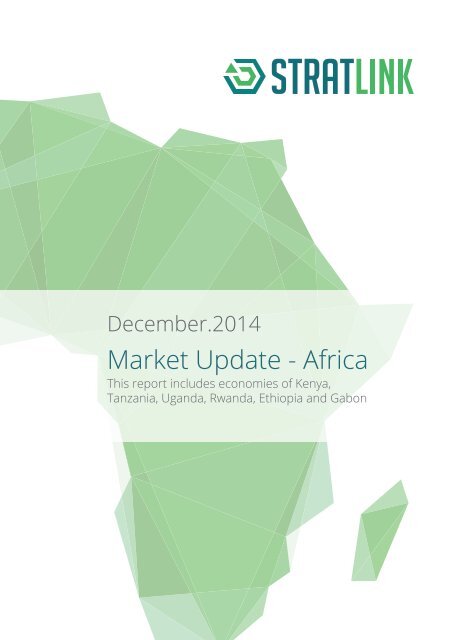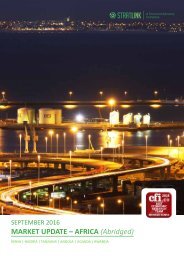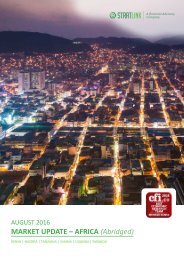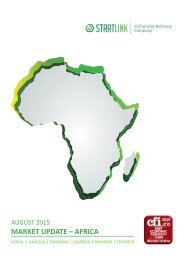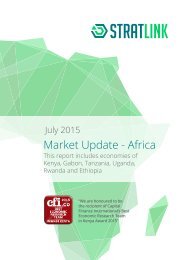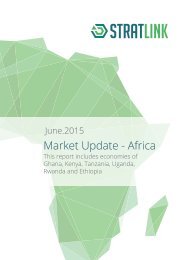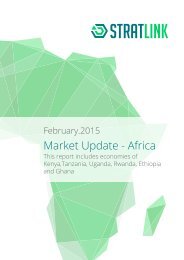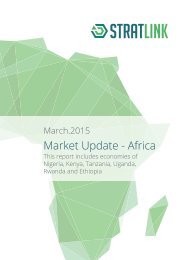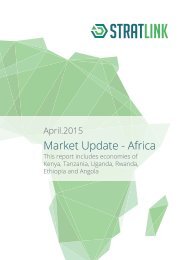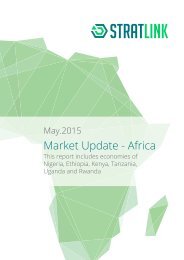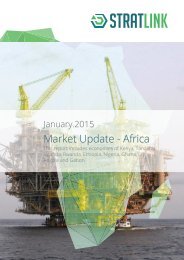Africa Market Update -December 2014
You also want an ePaper? Increase the reach of your titles
YUMPU automatically turns print PDFs into web optimized ePapers that Google loves.
<strong>December</strong>.<strong>2014</strong><br />
<strong>Market</strong> <strong>Update</strong> - <strong>Africa</strong><br />
This report includes economies of Kenya,<br />
Tanzania, Uganda, Rwanda, Ethiopia and Gabon
01. Kenya<br />
2 | StratLink <strong>Africa</strong> Ltd.<br />
www.stratlinkglobal.com
MARKET UPDATE – AFRICA | November <strong>2014</strong><br />
POLITICAL OUTLOOK<br />
Untamed Insecurity: Kenya’s<br />
Achilles’ heel<br />
A spate of attacks seems to be resurfacing,<br />
dimming the country’s risk outlook. In<br />
November <strong>2014</strong>, the Mandera bus massacre<br />
(allegedly linked to the Al Shabaab)<br />
has claimed twenty eight lives while that<br />
in Kapedo (allegedly linked to inter-ethnic<br />
strife) left twenty one dead in its wake.<br />
Growing disenchantment has elicited demonstrations<br />
indicative of waning public confidence<br />
in the state’s handling of security.<br />
The co-existence of external and domestic<br />
security gaps paints Kenya in a particularly<br />
vulnerable position that is bound raise investors’<br />
concern. Radicalization, especially<br />
amongst the youth at the Coastal region,<br />
remains a pressure point for the country’s<br />
security with state response such as the<br />
closure of mosques deemed to have been<br />
used by militia fuelling a perception of targeting<br />
along religious lines.<br />
Other response measures such as the operation<br />
to weed out illegal immigrants and<br />
the Lamu town 6:30am – 6:30pm curfew<br />
that lasted until November 23rd, <strong>2014</strong> have<br />
also been widely perceived as targeting the<br />
Muslim community.<br />
ECONOMIC OUTLOOK<br />
Increased County Allocation: Boon<br />
or bane?<br />
The country’s fiscal position will come<br />
under sharp focus as the central government<br />
plans to increase county allocation by<br />
23.2%, year-on-year, in FY2015/16. County<br />
expenditure has been considerably recurrent<br />
since inception, diminishing the prospects<br />
of the devolved structure accelerating<br />
the bridging of existing deficit in supporting<br />
infrastructure such as roads, telecommunications<br />
and electricity.<br />
High recurrent expenditure is bound to<br />
remain a key challenge for county governments<br />
given the fact that majority inherited<br />
debt from respective local governments.<br />
This will impact negatively on the investment<br />
outlook as capital expenditure is<br />
constrained creating gaps in enabling infrastructure<br />
for the business environment.<br />
BUSINESS ENVIRONMENT<br />
The country’s cost of energy is becoming more investor friendly<br />
and if sustained, could see a marked increase in investment<br />
in Kenya due to lowered operational costs. Cost of fuel adjustment<br />
in electricity bills has declined by 108.1% between<br />
August and October <strong>2014</strong> to USD 0.04 1 , translating to lower<br />
energy costs for investors. This is attributable to increased<br />
generation of cost-effective geothermal power that is being<br />
added onto the national grid.<br />
The additional geothermal electricity is in line with the national<br />
plan to inject an additional 5,000.0 megawatts into the national<br />
grid by 2016.<br />
Nairobi County government inherited USD<br />
177.3 million in debt from the city council.<br />
County Expenditure Structure<br />
FY2013/14<br />
Source: Controller of Budget, StratLink <strong>Africa</strong><br />
The central government has declared intent<br />
to scale up county allocation to USD 3.1 billion<br />
following the push for increased allocation.<br />
This comes even as abysmal budgetary<br />
absorption on capital spending plagues majority<br />
of the devolved units.<br />
1 Energy Regulatory Commission November <strong>2014</strong><br />
High recurrent<br />
expenditure is<br />
bound to remain<br />
a key challenge<br />
for county<br />
governments<br />
given the fact that<br />
majority inherited<br />
debt from<br />
respective local<br />
governments.<br />
www.stratlinkglobal.com<br />
StratLink <strong>Africa</strong> Ltd.| 3
MARKET UPDATE – AFRICA | November <strong>2014</strong><br />
Counties such as<br />
Machakos are<br />
bound to benefit<br />
from proximity<br />
to Nairobi (64 km<br />
away) which eases<br />
mobility of labour<br />
from the country’s<br />
industrial and<br />
commercial<br />
hub. The county<br />
is also likely to<br />
benefit, in the<br />
long-term, from<br />
its investment in<br />
infrastructure.<br />
County Budget Allocation (USD Mln)<br />
Source: National Treasury, StratLink <strong>Africa</strong><br />
On average, Kenya faces an infrastructure<br />
funding deficit of USD 2.1 billion per annum<br />
indicating need for both austerity in<br />
recurrent expenditure and new funding<br />
streams 2 . Select counties are, however, setting<br />
the pace in capital spending and could<br />
provide lucrative satellite investment hubs<br />
in the coming years if the trend is sustained.<br />
The Public Finance and Management Act<br />
(2012) provides that counties should allocate<br />
at least 30.0% of annual budgets to<br />
capital spending.<br />
Development Expenditure (% of<br />
Total Expenditure)<br />
the country’s industrial and commercial<br />
hub. The county is also likely to benefit, in<br />
the long-term, from its investment in infrastructure.<br />
(Kenya Chamber of Commerce and Industry<br />
identified Machakos as the choice location for<br />
establishment of a USD 11.1 million tyre recycling<br />
facility).<br />
Machakos County Snapshot<br />
Source: CRA Estimates, StratLink <strong>Africa</strong><br />
Revenue Collection Presents Risk<br />
We note that the proposed increase in<br />
county allocation comes on the back of a<br />
projected 44.2% decline, year-on-year, in<br />
budget deficit to USD 3.8 billion in <strong>2014</strong>/15.<br />
This is likely to be based on, amongst other<br />
factors, strong performance by the debut<br />
Eurobond, out of which USD 1.4 billion is<br />
expected to fund infrastructure spending.<br />
Budget Deficit (USD Mln)<br />
Source: Controller of Budget, StratLink <strong>Africa</strong><br />
Counties such as Machakos are bound to<br />
benefit from proximity to Nairobi (64km<br />
away) which eases mobility of labour from<br />
2 World Bank Country Report<br />
Source: KNBS, StratLink <strong>Africa</strong><br />
Fiscal risks are, however, likely to emerge<br />
owing to an adverse economic environment<br />
in the first half of <strong>2014</strong>. Terror risk and delay<br />
in signing Economic Partnership Agree-<br />
4 | StratLink <strong>Africa</strong> Ltd.<br />
www.stratlinkglobal.com
MARKET UPDATE – AFRICA | November <strong>2014</strong><br />
ments with Europe slowed down business<br />
activity and could manifest in below target<br />
revenue mobilization by the government.<br />
Further, issuance of an infrastructure bond<br />
four months after the Eurobond issuance<br />
indicates that government coffers could be<br />
cash-strapped.<br />
Kenya Revenue Authority has reported<br />
that revenue collection for the first half of<br />
<strong>2014</strong>/15 fell short of target by USD 189.1<br />
million representing a 90.2% performance<br />
rate. This comes against a backdrop of a<br />
strong 102.9% performance rate in 2013/14.<br />
Prospect of Counties issuing Asset<br />
Backed Securities: Promise or Peril?<br />
The Capital <strong>Market</strong>s Authority is reported to<br />
have prepared a draft policy that will guide<br />
sale of Asset Backed Securities by county<br />
governments. If it materializes, counties will<br />
identify suitable projects and package them<br />
as debt securities in raising capital.<br />
At the moment, majority of the counties are<br />
running high recurrent expenditure that is,<br />
in part, driven by fiscal imprudence. In the<br />
first quarter of 2013/14, twenty seven counties<br />
(out of forty seven) spent no money on<br />
development expenditure with a lot of resources<br />
channelled towards foreign travel<br />
and conferences 3 . Such fiscal indiscipline<br />
could present grave risk for investors if<br />
counties raise capital through Asset Backed<br />
Securities since the likelihood of default<br />
cannot be overlooked. Further, financial improbity<br />
is still a challenge in the Kenyan environment<br />
with a recent government audit<br />
indicating the government has been losing<br />
up to USD 66.6 million per annum in salaries<br />
to non-existent workers.<br />
The tap sale has also served to mop up<br />
some of the excess liquidity that was rising<br />
on the back of net government payments<br />
and maturity of term auction deposits.<br />
91 Day T-Bill Accepted Bids (USD Mln)<br />
Source: Central Bank of Kenya, StratLink <strong>Africa</strong><br />
The upswing in the short-term end of the<br />
curve, however, indicates rising government<br />
appetite for domestic borrowing. Despite<br />
government efforts, liquidity remains high<br />
in the money market with marginal upward<br />
movement in the interbank rate.<br />
(From an external debt position, the country<br />
returned to the international market by reopening<br />
both the five year and ten year issues<br />
of the Eurobond with an aim to raise USD 500<br />
million – USD 700 million)<br />
Bloomberg BVAL Yields Index<br />
In the first quarter<br />
of 2013/14, twenty<br />
seven counties<br />
(out of forty seven)<br />
spent no money<br />
on development<br />
expenditure with<br />
a lot of resources<br />
channelled<br />
towards foreign<br />
travel and<br />
conferences.<br />
Such fiscal<br />
indiscipline could<br />
present grave<br />
risk for investors<br />
if counties raise<br />
capital through<br />
Asset Backed<br />
Securities since<br />
the likelihood of<br />
default cannot be<br />
overlooked.<br />
DEBT MARKET UPDATE<br />
The market continues to be characterized<br />
by marginal movement of the yield curve in<br />
what fixed income dealers say points at the<br />
impact of Eurobond proceeds. However, the<br />
issuance of a Tap Sale to raise USD 221.9<br />
million in quick succession to the twelve<br />
year infrastructure bond that raised USD<br />
166.5 million augments our view that government<br />
appetite for domestic borrowing is<br />
likely to be elevated in the coming months.<br />
Source: Bloomberg, StratLink <strong>Africa</strong><br />
The interbank rate was on the downtrend<br />
for the better part of the month before starting<br />
to exhibit an uptick in the latter phase.<br />
3 Controller of Budget Report January <strong>2014</strong><br />
www.stratlinkglobal.com<br />
StratLink <strong>Africa</strong> Ltd.| 5
MARKET UPDATE – AFRICA | November <strong>2014</strong><br />
We expect the<br />
Central Bank to<br />
continue mopping<br />
up excess liquidity<br />
from the market<br />
with a view<br />
to supporting<br />
the shilling. It<br />
will, however,<br />
be a fragile<br />
balancing act as<br />
there is need to<br />
boost exports’<br />
competitiveness<br />
following<br />
depressed global<br />
commodity prices<br />
in the first half<br />
of <strong>2014</strong> that<br />
threatens fiscal<br />
implications.<br />
Interbank Rate<br />
Source: Bloomberg, StratLink <strong>Africa</strong><br />
The rate touched a low of 6.3% on November<br />
14th, <strong>2014</strong> after which it began nudging<br />
upwards. The market, however, remains<br />
liquid driven by net government payments.<br />
Uptake of the 91 Day T-Bill paper has risen<br />
by 100.0% between October and November<br />
<strong>2014</strong>, pointing at an increase in liquidity in<br />
the market.<br />
91 Day T-Bill Average Bid-to-cover Ratio<br />
November <strong>2014</strong> Fifteen Year Reopened<br />
Bond<br />
Description<br />
Amount<br />
Offered (USD Mln) 166.7<br />
Received (USD Mln) 132.2<br />
Performance Rate 79.3%<br />
Yield 12.4%<br />
Source: Central Bank of Kenya, StratLink <strong>Africa</strong><br />
We expect the Central Bank to continue<br />
mopping up excess liquidity from the market<br />
with a view to supporting the shilling. It<br />
will, however, be a fragile balancing act as<br />
there is need to boost exports’ competitiveness<br />
following depressed global commodity<br />
prices in the first half of <strong>2014</strong> that threatens<br />
fiscal implications. Diaspora remittances<br />
were marginally depressed in September<br />
<strong>2014</strong>, 1.1% lower that August <strong>2014</strong>’s 128.8<br />
million, further inflicting downward pressure<br />
on the shilling.<br />
Kenya Shilling vs US Dollar Exchange<br />
Source: Central Bank of Kenya, StratLink <strong>Africa</strong><br />
The re-opened fifteen year bond (FXD<br />
1/2010/15) also registered under-subscription<br />
in what is likely to have been driven by a<br />
low coupon rate. At 10.0%, the paper’s coupon<br />
rate stood 218.0 bps below the fifteen<br />
year paper issued in February <strong>2014</strong> that registered<br />
a performance rate of 234.4%.<br />
Source: Bloomberg, StratLink <strong>Africa</strong><br />
The local unit breached the 90.0 psychological<br />
exchange rate against the greenback<br />
on November 11th, <strong>2014</strong>. The shilling shed<br />
1.2% and 4.2% month-on-month and yearon-year,<br />
respectively to close November<br />
<strong>2014</strong> at 90.1 units to the greenback.<br />
6 | StratLink <strong>Africa</strong> Ltd.<br />
www.stratlinkglobal.com
MARKET UPDATE – AFRICA | November <strong>2014</strong><br />
EQUITY MARKET UPDATE<br />
NSE 20 Share Index Trend<br />
13.2% surge in the group’s portfolio value<br />
to USD 355.2 million from March <strong>2014</strong>. The<br />
group’s prospects in entering the foray of<br />
fast moving consumer goods and energy<br />
sector are bound to keep investor expectations<br />
high.<br />
Banks also incited investor activity with<br />
Kenya Commercial Bank’s (KCB) net profit<br />
growing by 19.8% to USD 126.1 million as at<br />
September <strong>2014</strong>. Strong growth in foreign<br />
exchange income trading has emerged as<br />
the key driver of the bank’s performance,<br />
year-on-year to September <strong>2014</strong>, and will<br />
be a critical engine going forward as banks<br />
focus less on interest income.<br />
+1.1 %<br />
NSE 20 Share Index<br />
year-on-year change<br />
-3.2 %<br />
NSE 20 Share Index<br />
month-on-month<br />
change<br />
Source: Bloomberg, StratLink <strong>Africa</strong><br />
NSE 20 Share Index Month-on-Month<br />
Source: Bloomberg, StratLink <strong>Africa</strong><br />
The market is beginning to nudge upwards<br />
after a bear run in October and the first half<br />
of November <strong>2014</strong>. The uptick has been<br />
occasioned by favourable Q3<strong>2014</strong> results<br />
posted by listed companies. The uptick is,<br />
however, unlikely to be prolonged owing to<br />
the fact that investors keen on cashing profit<br />
made in <strong>2014</strong> are likely to sell before Capital<br />
Gains Tax takes effect in January 2015.<br />
Strong Results Boost <strong>Market</strong><br />
Performance<br />
Centum Group posted 37.9% growth in net<br />
profit in the period to September <strong>2014</strong> to<br />
USD 13.7 million. This comes on the back of<br />
KCB Select Income Streams Growth<br />
Year-on-Year to September <strong>2014</strong><br />
Source: Company Financials <strong>2014</strong>, StratLink <strong>Africa</strong><br />
Telephony operator, Safaricom, resumed a<br />
rally at the exchange following its Q3<strong>2014</strong><br />
results that saw its total revenue increase<br />
by 14.6% to USD 881.1 million. We note that<br />
mobile money revenue continues to be one<br />
of the company’s two main revenue lines,<br />
growing by 24.7% to USD 173.2 million.<br />
Growth in mobile money subscribers also<br />
outstrips that of the customer base at 9.9%<br />
and 4.9%, respectively.<br />
In this regard, it will be interesting to see the<br />
company’s performance once Equity Bank’s<br />
mobile virtual network operator enters the<br />
market.<br />
The market is<br />
beginning to<br />
nudge upwards<br />
after a bear run<br />
in October and<br />
the first half of<br />
November <strong>2014</strong>.<br />
The uptick has<br />
been occasioned<br />
by favourable<br />
Q3<strong>2014</strong> results<br />
posted by listed<br />
companies.<br />
www.stratlinkglobal.com<br />
StratLink <strong>Africa</strong> Ltd.| 7
MARKET UPDATE – AFRICA | November <strong>2014</strong><br />
Despite registering<br />
a 4.5% increase<br />
in revenue, yearon-year<br />
to USD<br />
620.5 million,<br />
high costs and an<br />
impairment loss of<br />
USD 59.8 million<br />
on depreciation of<br />
aircraft depressed<br />
aggregate<br />
performance.<br />
Suspension of<br />
flights to the Ebola<br />
hit nations of<br />
Liberia and Sierra<br />
Leone occasioned<br />
a 20.0% decline<br />
in passenger<br />
capacity.<br />
Safaricom Share Performance<br />
Source: Bloomberg, StratLink <strong>Africa</strong><br />
Ebola Sinks Hole in Kenya Airways<br />
Numbers<br />
National carrier, Kenya Airways, subdued<br />
the market after reporting USD 116.1 million<br />
in net loss for the period to September<br />
<strong>2014</strong>. Despite registering a 4.5% increase<br />
in revenue, year-on-year to USD 620.5 million,<br />
high costs and an impairment loss of<br />
USD 59.8 million on depreciation of aircraft<br />
depressed aggregate performance. Suspension<br />
of flights to the Ebola hit nations of Liberia<br />
and Sierra Leone occasioned a 20.0%<br />
decline in passenger capacity.<br />
Low arrival numbers driven by terror related<br />
risk in the first half of <strong>2014</strong> has also<br />
been cited as a driver of the abysmal performance.<br />
Kenya Airways<br />
Uchumi: Rights Issue Vital for Future<br />
Growth<br />
Uchumi is hard pressed to have investors<br />
soak up all rights in the November <strong>2014</strong><br />
cash call as it confronts ferocious competition<br />
in the retail market. However, a declining<br />
share price has stoked apathy from<br />
most investors and the company could confront<br />
under-subscription. The retail chain is<br />
offering 99,534,980 new shares targeted at<br />
raising USD 9.9 million geared towards regional<br />
expansion.<br />
Kenya’s Big Four Retail Players<br />
(<strong>Market</strong> Share by Revenue)<br />
Source: <strong>Africa</strong> Investment Bank <strong>2014</strong>, StratLink <strong>Africa</strong><br />
With global and retail giants such as Shoprite<br />
and Walmart eyeing the East <strong>Africa</strong>n<br />
market, Uchumi faces an uphill task in leveraging<br />
on competitive edge. This is further<br />
aggravated by strained financial performance<br />
in the recent past.<br />
Uchumi Revenue and Gross Profit<br />
Growth Year-on-Year<br />
Source: Bloomberg, StratLink <strong>Africa</strong><br />
Source: Company Financials, StratLink <strong>Africa</strong><br />
8 | StratLink <strong>Africa</strong> Ltd.<br />
www.stratlinkglobal.com
02. Tanzania<br />
www.stratlinkglobal.com<br />
StratLink <strong>Africa</strong> Ltd.| 9
MARKET UPDATE – AFRICA | November <strong>2014</strong><br />
BUSINESS ENVIRONMENT<br />
POLITICAL OUTLOOK<br />
Navigating Blurred Lines on Press<br />
Freedom<br />
Press freedom is likely to emerge as a pressure<br />
point on the country’s political risk outlook<br />
in the near future. The drafting of a bill<br />
which, if passed, criminalizes publication<br />
of statistics without the National Statistical<br />
Agency’s approval navigates the blurred<br />
lines of press freedom. If enacted, the provision<br />
will heighten the country’s vulnerability<br />
to state control of information and curtailment<br />
of freedom of speech. Coming ahead<br />
of the 2015 election, the move is likely to be<br />
perceived as a wider scheme by the government<br />
to control flow of information. This<br />
could occasion rising temperatures going<br />
forward especially as forces opposed to the<br />
ruling Chama Cha Mapinduzi (CCM) use it as<br />
a platform to galvanize public support.<br />
Political temperatures are rising as the<br />
country approaches the 2015 election and<br />
opposition forces strategize on a possible<br />
coalition. Whereas there is need for responsible<br />
journalism, the bill proposed by CCM<br />
could leave the government tinkering on<br />
the verge of undermining press freedom.<br />
ECONOMIC OUTLOOK<br />
Deferred Budget Support Exerts<br />
Pressure on Shilling<br />
The shilling breached 1,710.0 to the US dollar<br />
mark, in what we assess as the impact of<br />
deferred aid by development partners. The<br />
deferment of up to USD 500.0 million by<br />
Investors could begin benefiting from reduced energy costs if<br />
the planned disbursement of USD 1.0 billion, towards enhancing<br />
connectivity to the national grid, by World Bank and <strong>Africa</strong><br />
Development Bank proceeds as scheduled. Cost-effective<br />
energy is increasingly becoming a highly competitive platform<br />
in the region as economies look to bolster manufacturing.<br />
Further to this investment, the Tanzanian government plans to<br />
construct a 400 kV (USD 228.0 million) transmission line connecting<br />
it to Kenya. Kenya has recently experienced a decline<br />
in electricity tariffs driven by reduced fuel adjustment costs as<br />
the government explores cheaper sources of energy.<br />
partners, including Germany, United Kingdom<br />
and Denmark, is manifesting itself in a<br />
shortage of the greenback in the domestic<br />
market thereby depreciating the local unit.<br />
We are unlikely to see the shilling retrace<br />
the resilience exhibited through October<br />
<strong>2014</strong>, attributable to factors perceived to<br />
be high risk by investors – forthcoming election<br />
and delayed passing of the new constitution.<br />
Tanzania Shilling vs USD Exchange<br />
Source: Bloomberg, StratLink <strong>Africa</strong><br />
Development partners have deferred the<br />
above mentioned budget support in view of<br />
alleged embezzlement of up to USD 122.0<br />
million by government officials through dubious<br />
government contracts. The office of<br />
the Controller and Auditor General is now<br />
expected to table a report before the Parliament<br />
following an audit exercise of the alleged<br />
scam.<br />
Structural challenges to keep<br />
shilling weak<br />
Over and above pressure from deferred<br />
budget, the shilling will remain weak owing<br />
to structural factors. Despite a marginal<br />
year-on-year decline in importation of capital<br />
goods, intermediate and consumption<br />
goods continue to register an increase. This<br />
growing appetite is bound to further depress<br />
the local unit. As such, exporters are<br />
bound to witness a rise in competitiveness<br />
of products, while importers grapple with<br />
mitigating the rising cost occasioned by a<br />
weakening shilling.<br />
10 | StratLink <strong>Africa</strong> Ltd.<br />
www.stratlinkglobal.com
MARKET UPDATE – AFRICA | November <strong>2014</strong><br />
Structure of Imports<br />
Source: Bank of Tanzania, StratLink <strong>Africa</strong><br />
The country’s deteriorating current account<br />
also indicates that further to the balance<br />
of payments, inflow of foreign currency,<br />
through such avenues as net income from<br />
abroad, has also impacted the shilling.<br />
Current Account Trend (USD Mln)<br />
T-Bill Yields Trends<br />
Source: Bank of Tanzania, StratLink <strong>Africa</strong><br />
The 91 Day paper saw its yield rise by forty<br />
bps, month-on-month, to 11.7% in November<br />
<strong>2014</strong>. On the same trajectory, the 182<br />
Day and 364 Day bills’ yields rose by thirty<br />
and forty bps to close the month at 13.7%<br />
and 14.4%, respectively. With-held budget<br />
support has also resulted in tightening liquidity<br />
in the money market.<br />
Interbank Rate vs Volume<br />
The country’s<br />
deteriorating<br />
current account<br />
also indicates<br />
that further to<br />
the balance<br />
of payments,<br />
inflow of foreign<br />
currency, through<br />
such avenues as<br />
net income from<br />
abroad, has also<br />
impacted the<br />
shilling.<br />
Date<br />
Current Account Balance<br />
31-Aug-12 -3,659.5<br />
31-Aug-13 -4,451.7<br />
31-Aug-14 -4,791.8<br />
Source: Bank of Tanzania, StratLink <strong>Africa</strong><br />
DEBT MARKET UPDATE<br />
In line with our forecast in October <strong>2014</strong>,<br />
yields have continued to rise in the debt<br />
market. This comes as development partners<br />
with-hold budgetary support (amounting<br />
to about 17.7% of the country’s official<br />
development assistance and 4.2% of<br />
FY14/15 budget). Thus, the government<br />
will be compelled to tap into the domestic<br />
market to meet the deficit created. Until<br />
the question of graft allegations is resolved<br />
and with-held funding disbursed, yields are<br />
likely to remain on an uptrend pegged on<br />
the government’s appetite for domestic<br />
borrowing.<br />
Source: National Bureau of Statistics, StratLink <strong>Africa</strong><br />
Tightening liquidity has constrained investor<br />
uptake of debt instruments with the 91<br />
Day T-Bill bid-to-cover ratio averaging 0.3 in<br />
November.<br />
www.stratlinkglobal.com<br />
StratLink <strong>Africa</strong> Ltd.| 11
MARKET UPDATE – AFRICA | November <strong>2014</strong><br />
Despite the<br />
slowdown, we<br />
expect the market<br />
to remain bullish<br />
driven by recent<br />
reforms to boost<br />
foreign investor<br />
participation.<br />
91 Day T-Bill Bid-to-cover Ratio Trend<br />
of Swala Oil and Gas. The share’s rally, peaking<br />
at USD 0.9 (thirteen fold its listing price)<br />
on November 10th, <strong>2014</strong>, kept the market<br />
on bullish trajectory in October <strong>2014</strong>.<br />
Investors have been in a rush to invest in<br />
Swala owing to the country’s new found<br />
natural resources, widely expected to be a<br />
growth engine for the economy.<br />
Swala Oil and Gas Share Performance<br />
Source: Bank of Tanzania, StratLink <strong>Africa</strong><br />
- 4.1 %<br />
All Share Index<br />
month-on-month<br />
change<br />
EQUITY MARKET UPDATE<br />
Dar es Salaam Exchange All Share Index<br />
Source: Bloomberg, StratLink <strong>Africa</strong><br />
+39.5 %<br />
All Share Index<br />
year-on-year change<br />
Source: Bloomberg, StratLink <strong>Africa</strong><br />
All Share Index Month-on-month Trend<br />
Despite the slowdown, we expect the<br />
market to remain bullish driven by recent<br />
reforms to boost foreign investor participation.<br />
Further, the listing of Mkombozi<br />
Commercial Bank comes against the backdrop<br />
of improved performance by banking<br />
counters and is likely to attract high interest<br />
pushing the market’s performance up in the<br />
next month.<br />
Indices Comparison<br />
Source: Bloomberg, StratLink <strong>Africa</strong><br />
It has been a month of less than impressive<br />
performance at the exchange with the<br />
All Share Index taking a general downtrend.<br />
We attribute this performance to the waning<br />
of investor excitement around the listing<br />
Source: Dar es Salaam Exchange, StratLink <strong>Africa</strong><br />
12 | StratLink <strong>Africa</strong> Ltd.<br />
www.stratlinkglobal.com
MARKET UPDATE – AFRICA | November <strong>2014</strong><br />
03. Uganda<br />
www.stratlinkglobal.com<br />
StratLink <strong>Africa</strong> Ltd.| 13
MARKET UPDATE – AFRICA | November <strong>2014</strong><br />
BUSINESS ENVIRONMENT<br />
POLITICAL OUTLOOK<br />
New Anti-gay Law: Angling for 2016<br />
Consideration of a new anti-gay law, following<br />
nullification of the February <strong>2014</strong> law<br />
by the Constitutional Court, is the latest indicator<br />
that Yoweri Museveni is eyeing the<br />
presidency in 2016. In the new draft, the ruling<br />
National Resistance Movement (NRM) is<br />
toying with semantics outlawing “unnatural<br />
sexual acts” as opposed to the explicit mention<br />
of “homosexuality”. The move is widely<br />
perceived as an attempt by NRM to entice<br />
the conservative voting block ahead of the<br />
elections. Opposition forces are reported to<br />
be setting up a coalition with a view to challenging<br />
the incumbent, Yoweri Museveni, in<br />
2016. The international community’s reaction<br />
to the preceding law (February <strong>2014</strong>)<br />
was less stern than expected and NRM is<br />
likely to peg its expectations on the precedent.<br />
NRM targets having the new law passed before<br />
the end of <strong>2014</strong>. In September <strong>2014</strong>,<br />
President Museveni sacked Amama Mbabazi<br />
from the position of Prime Minister in a<br />
move that was widely viewed as cautionary<br />
to would be dissidents within the NRM.<br />
ECONOMIC OUTLOOK<br />
<strong>2014</strong> Census Findings Key for<br />
Investors<br />
As the country awaits findings of the August<br />
<strong>2014</strong> census, focus is likely to shift to the<br />
country’s demographics and its implications<br />
on the investment climate. Our estimates<br />
Disbursement of USD 10.9 million in compensation towards<br />
persons displaced due to construction of Kabaale Oil Refinery<br />
augurs well for investors. This marks a step forward in paving<br />
way for investors targeting and those already in the country’s<br />
oil sector. Resettlement and compensation is emerging as a<br />
thorny issue in economies such as Kenya, Uganda and Tanzania<br />
with disruption of exploration activities as an imminent<br />
risk. In 2013, British company, Tullow Oil, suspended exploration<br />
efforts in Kenya for a week as locals decried discrimination<br />
in employment and tender allocation. The step taken by<br />
Uganda’s government in compensating displaced persons will<br />
help mitigate such risks.<br />
indicate Uganda’s population is likely to<br />
stand at about 37.5 million given an average<br />
population growth rate of 3.4% between<br />
2000 and 2012 and a population of 25.9<br />
million reported in the last census. Trends<br />
in income distribution augur well for the<br />
investment climate with the middle 60.0%<br />
population’s ratio of total income having<br />
been on an uptick in the recent past.<br />
Middle 60.0% of Population’s<br />
Income as % of Total Income<br />
Source: BMI <strong>2014</strong>, StratLink <strong>Africa</strong><br />
This translates to less income inequality between<br />
the top 20.0% income earners and<br />
the middle 60.0% creating a sound platform<br />
for sustainable economic growth in Uganda<br />
in the long-term. Historically, income inequality<br />
has been played a part in bringing<br />
about for fragile growth since it necessitates<br />
redistribution measures that tend to undermine<br />
growth high taxes sustained in the<br />
long-term curtail investment and consumption<br />
while high subsidies dis-incentivise<br />
work and enterprise. 4<br />
Further, inequality renders economies susceptible<br />
to shocks through social upheaval.<br />
4 IMF Staff Discussion Note Redistribution, Inequality and<br />
Growth February <strong>2014</strong><br />
www.stratlinkglobal.com<br />
StratLink <strong>Africa</strong> Ltd.| 14
MARKET UPDATE – AFRICA | November <strong>2014</strong><br />
Top 20.0% of Population’s Income as<br />
% of Total Income<br />
Source: BMI <strong>2014</strong>, StratLink <strong>Africa</strong><br />
Looking at the Gini Coefficient 5 , Kenya posts<br />
wider income inequality than Uganda. Four<br />
economies in the region have also posted<br />
an inverse relationship between income<br />
inequality and economic growth. This indicates<br />
that, amongst other factors comparatively,<br />
higher income inequality undermines<br />
an economy’s growth potential.<br />
Income Gini Coefficient vs GDP<br />
Growth Rate<br />
from the dependent age brackets (0-15<br />
years and over 65) in the coming years.<br />
Dependency Indicators<br />
Risks to Outlook<br />
Source: BMI <strong>2014</strong>, StratLink <strong>Africa</strong><br />
With agriculture accounting for 85.0% of the<br />
country’s employment, its performance in<br />
the coming years will be a key determinant<br />
in inequality trends. The imposition of tax on<br />
agricultural inputs could, in the long-term,<br />
decelerate the sector’s growth momentum,<br />
which has been trending below average in<br />
the last three years.<br />
Agriculture Sector Growth<br />
Looking at the<br />
Gini Coefficient,<br />
Kenya posts<br />
wider income<br />
inequality than<br />
Uganda. Four<br />
economies in the<br />
region have also<br />
posted an inverse<br />
relationship<br />
between income<br />
inequality and<br />
economic growth.<br />
Source: UNDP <strong>2014</strong>, StratLink <strong>Africa</strong><br />
Source: Uganda Bureau of Statistics, StratLink <strong>Africa</strong><br />
The country is also bound to benefit from<br />
a declining dependency burden given the<br />
young population that will transition into<br />
the labour force. As such, the Ugandan<br />
economy is bound to experience less strain<br />
5 The coefficient is used to measure inequality with 0<br />
representing perfect equality in a society while 100 represents<br />
perfect inequality<br />
15 | StratLink <strong>Africa</strong> Ltd.<br />
www.stratlinkglobal.com
MARKET UPDATE – AFRICA | November <strong>2014</strong><br />
-2.2 %<br />
Uganda shilling<br />
depreciation<br />
month-on-month<br />
-8.5 %<br />
Uganda shilling<br />
depreciation<br />
year-on-year<br />
DEBT MARKET UPDATE<br />
After six months of a steady downtrend in<br />
inflation, there has been a thirty bps surge,<br />
month-on-month, to 2.1% in November<br />
<strong>2014</strong>. This conforms to our forecast in October<br />
<strong>2014</strong> of imminent uptick driven by<br />
trends in the food and energy indices that<br />
have been inching upwards. We expect inflation<br />
to remain on an up-trend in the near<br />
future given a likely lag impact of four consecutive<br />
months of a rise in the food and<br />
energy indices.<br />
Inflation Trend<br />
Appetite for domestic borrowing is likely<br />
to diminish in the near future as revenue<br />
mobilization registers high performance.<br />
Measures such as introduction of duty on<br />
agricultural imports in the FY14/15 budget<br />
are bound to see the government realize its<br />
revenue target, scaling down need for domestic<br />
borrowing.<br />
Uganda Revenue Authority has reported a<br />
99.8% performance rate in revenue mobilization<br />
in the first quarter of <strong>2014</strong>/15 having<br />
collected USD 1.0 billion. Domestic taxes,<br />
for the period, registered 100.0% performance<br />
rate raking in USD 549.8 million.<br />
Shilling Propped by Liquidity Mop Up<br />
Bank of Uganda issued a USD 103.5 million<br />
repo enabling the sliding shilling to exhibit<br />
a new found resilience at the tail end of<br />
November <strong>2014</strong>. We expect the shilling to<br />
maintain resilience given the traditional inflow<br />
of payment for coffee exports in the<br />
fourth quarter of the year.<br />
Uganda Shilling vs USD Exchange<br />
Source: Bank of Uganda, StratLink <strong>Africa</strong><br />
Despite the fact that inflation stands at a<br />
marked 330.0 bps below the October 2013 –<br />
October <strong>2014</strong> average of 5.4%, anticipation<br />
that this could be the beginning of a steady<br />
rise is likely to leave investors pricing in expectations<br />
in fixed income investments.<br />
Yield Curve Trend<br />
Source: Bank of Uganda, StratLink <strong>Africa</strong><br />
In line with the mop up, the interbank rate<br />
has risen in November <strong>2014</strong> indicative of<br />
tightening liquidity in the money market.<br />
The interbank rate has risen by 70.0 bps<br />
month-on-month and 60.0 bps year-to-date<br />
closing November <strong>2014</strong> at 9.4%.<br />
Source: Bloomberg, StratLink <strong>Africa</strong><br />
www.stratlinkglobal.com<br />
StratLink <strong>Africa</strong> Ltd.| 16
MARKET UPDATE – AFRICA | November <strong>2014</strong><br />
Average Overnight Interbank Rate<br />
The market is exhibiting a rebound after depressed<br />
performance in October <strong>2014</strong>. We<br />
note that the National Social Security Fund<br />
(NSSF) has extended a life-line to embattled<br />
Uganda Clays Ltd by offering to increase its<br />
stake in the company from 32.5% to 66.0%.<br />
The move is likely to have buoyed waning investor<br />
confidence in the company following<br />
its USD 1.2 million loss in 2013. In October<br />
<strong>2014</strong>, market performance was depressed<br />
by the company’s results. <strong>Market</strong> data reveals<br />
a significant drop in the trade of Uganda<br />
Clays Ltd shares in what is likely to be<br />
slowdown in sell-off by jittered investors.<br />
Source: Bank of Uganda, StratLink <strong>Africa</strong><br />
Uganda Clays Ltd Shares Traded<br />
EQUITY MARKET UPDATE<br />
Uganda Stock Exchange All Share Index<br />
+2.9 %<br />
All Share Index<br />
month-on-month<br />
change<br />
Source: Bloomberg, StratLink <strong>Africa</strong><br />
Source: Uganda Securities Exchange, StratLink <strong>Africa</strong><br />
NSSF will now convert its USD 6.1 million<br />
loan extended to Uganda Clays Ltd to shares<br />
thereby increasing its stake in the company.<br />
Being the most heavily traded counter in<br />
the market, the announcement of an interim<br />
dividend by Umeme Ltd is likely to occasion<br />
a marginal uptrend in the exchange’s<br />
performance in the near future.<br />
+19.4 %<br />
All Share Index<br />
year-on-year change<br />
UGSE All Share Month-on-month<br />
Umeme Share Performance<br />
Source: Bloomberg, StratLink <strong>Africa</strong><br />
Source: Bloomberg, StratLink <strong>Africa</strong><br />
17 | StratLink <strong>Africa</strong> Ltd.<br />
www.stratlinkglobal.com
04. Rwanda<br />
www.stratlinkglobal.com<br />
StratLink <strong>Africa</strong> Ltd.| 18
MARKET UPDATE – AFRICA | November <strong>2014</strong><br />
POLITICAL OUTLOOK<br />
Repressed Civil Liberties: Long-Term<br />
Fault Line<br />
Rwanda continues to be on the radar for repression<br />
of civil liberties as the High Court<br />
sentenced eight to jail terms for ‘incitement’.<br />
Reports indicate that the eight criticized<br />
President Paul Kagame, terming him<br />
as authoritarian. This reaction to critique<br />
indicates that the administration is failing<br />
as far as broadening democratic space is<br />
concerned.<br />
In 2011, the sentencing to jail of former<br />
Kagame allies, Faustin Nyamwasa, Theogene<br />
Rudasingwa and Patrick Karageya, for<br />
‘disturbing public order and threatening<br />
state security’ elicited grave concern over<br />
repression of rights in Rwanda. Whereas<br />
Kagame’s leadership is widely credited with<br />
the economic emergence of Rwanda, repression<br />
of rights and freedoms is bound to<br />
create fault lines that will present long-term<br />
fragilities.<br />
The Rwandese economy has had a robust<br />
decade (2003 – 2013) with stellar economic<br />
growth and improved business climate. Repressed<br />
liberties and pent up grievances<br />
are, however, likely to present a challenge<br />
as the nation begins contemplating a post-<br />
Kagame phase.<br />
ECONOMIC OUTLOOK<br />
The Recovery Path: Fragile but resilient<br />
Despite having a tough year characterized<br />
by fragile recovery in <strong>2014</strong>, the economy<br />
should remain resilient through the tail end.<br />
Growth momentum decelerated in Q2<strong>2014</strong><br />
(6.1%) but stood 180.0 bps above 2013’s aggregate<br />
growth pointing at sustained, albeit<br />
subdued, recovery. Two factors are likely to<br />
give impetus to the recovery process in the<br />
coming months: One, favourable weather<br />
is boosting supplies from the agriculture<br />
sector thereby anchoring inflation at single<br />
digits which is expected to rev up domestic<br />
consumption. Two, growth in the agriculture<br />
sector has been stable at 5.0% in the first<br />
two quarters of <strong>2014</strong> indicating defiance to<br />
depressed commodity prices. Coffee, one<br />
of the country’s key exports has suffered a<br />
downtrend in prices in the recent past.<br />
BUSINESS ENVIRONMENT<br />
The energy sector is expected to generate opportunities as<br />
the government targets public-private partnerships in view<br />
of growing demand. Electricity demand is projected to reach<br />
563.0 megawatts by 2017 against the present installed capacity<br />
of 155.0 megawatts. As economies such as Kenya engage<br />
on energy cost reduction measures, we expect Rwanda, driven<br />
by need to maintain pole position in ease of doing business,<br />
to adopt measures aimed at lowering the cost of energy. The<br />
government estimates capital requirement of about USD 3.0<br />
billion between <strong>2014</strong> and 2018 in meeting the envisioned<br />
energy generation target. 43.0% of this investment is expected<br />
to be drawn from private investors.<br />
Quarter-on-quarter GDP vs<br />
Agriculture Sector Growth<br />
Source: National Bureau of Statistics, StratLink <strong>Africa</strong><br />
Agriculture accounts for 70.0% of Rwanda’s<br />
export revenue; 36.0% of GDP and employs<br />
about 90.0% of the population both directly<br />
and indirectly 6 . The sector’s performance<br />
will be an indispensable lever in determining<br />
the country’s performance as it pursues<br />
economic recovery following the 2012/13<br />
foreign aid shock. The economy’s growth<br />
path has been mimicking that of agriculture,<br />
indicating that the new found momentum in<br />
the sector’s growth bodes well for the near<br />
term outlook if sustained.<br />
6 Institute of Policy Analysis and Research Rwanda<br />
The Rwandese<br />
economy has had<br />
a robust decade<br />
(2003 – 2013) with<br />
stellar economic<br />
growth and<br />
improved business<br />
climate. Repressed<br />
liberties and pent<br />
up grievances<br />
are, however,<br />
likely to present<br />
a challenge as<br />
the nation begins<br />
contemplating<br />
a post-Kagame<br />
phase.<br />
19 | StratLink <strong>Africa</strong> Ltd.<br />
www.stratlinkglobal.com
MARKET UPDATE – AFRICA | November <strong>2014</strong><br />
-1.1 %<br />
Rwanda franc<br />
month-on-month<br />
depreciation<br />
+4.3 %<br />
Rwanda franc yearon-year<br />
depreciation<br />
Government Expenditure<br />
Reports indicate that the government is<br />
intent upon scaling up expenditure with a<br />
view to accelerating the economy’s recovery.<br />
Government Expenditure vs GDP<br />
Growth<br />
DEBT MARKET UPDATE<br />
Yields in the T-Bill market have resumed a<br />
downtrend in November <strong>2014</strong>. We view this,<br />
primarily, as a consequence of a favourable<br />
outlook on inflation trends by investors.<br />
Inflation has been on a steady downtrend<br />
for six months standing at 2.2% in October<br />
<strong>2014</strong>. Investors are likely expecting the<br />
trend to persist driven by declining global oil<br />
prices that will ease the burden of imported<br />
inflation.<br />
Inflation<br />
Source: BMI <strong>2014</strong>, StratLink <strong>Africa</strong><br />
This is bound to be a crucial catalyst for<br />
economic growth given Rwanda’s reliance<br />
on government expenditure as an engine<br />
of growth. Between 2003 and 2013, government<br />
expenditure grew by an average<br />
11.2% while GDP growth averaged 7.3% 7 .<br />
Source: National Bureau of Statistics, StratLink <strong>Africa</strong><br />
Bank of Rwanda targets keeping inflation<br />
below 5.0% 8 , but does not specify bands<br />
within which it is expected to trend. Despite<br />
a favourable outlook, we are wary of this<br />
pace of disinflation, which if sustained could<br />
expose the economy to the risk of deflation.<br />
T-Bill Yields’ Trend<br />
Source: Bank of Rwanda, StratLink <strong>Africa</strong><br />
7 Business Monitor International <strong>2014</strong> 8 Bank of Rwanda Monetary Policy Outlook Q4<strong>2014</strong><br />
www.stratlinkglobal.com<br />
StratLink <strong>Africa</strong> Ltd.| 20
MARKET UPDATE – AFRICA | November <strong>2014</strong><br />
The 91 Day paper registered a marginal ten<br />
bps decline in yield, month-on-month, closing<br />
November <strong>2014</strong> at 4.4%. The 182 Day<br />
and 364 Day papers saw their yields decline<br />
by thirty and ten bps closing the month at<br />
4.9% and 6.2%, respectively. Declining yields<br />
together with increased uptake of treasury<br />
bills points at rising liquidity in the market.<br />
EQUITY MARKET UPDATE<br />
Rwanda Stock Exchange All Share Index<br />
91 Day T-Bill Bid-to-Cover Ratio<br />
Average<br />
Source: Bloomberg, StratLink <strong>Africa</strong><br />
RSE All Share Index Month-on-Month<br />
-4.1 %<br />
All Share Index<br />
month-on-month<br />
change<br />
Source: National Bureau of Statistics, StratLink <strong>Africa</strong><br />
Our view on rising liquidity is corroborated<br />
by the depreciation of the Rwanda Franc<br />
against the greenback in November <strong>2014</strong>.<br />
The local unit has come under pressure<br />
after correcting in mid-November <strong>2014</strong> in<br />
view of strong appreciation in the first week<br />
of the month. The appreciation is likely to<br />
have come as a result of a spike in the value<br />
of coffee exported surging by 31.7% between<br />
August and September <strong>2014</strong> to USD<br />
11.6 million.<br />
Rwanda Franc vs USD Exchange<br />
Source: Bloomberg, StratLink <strong>Africa</strong><br />
The bear run is showing signs of abating after<br />
persisting for two months. We note that<br />
this has been in line with trends in Bralirwa’s<br />
share price, which seems to be finding support<br />
at the USD 0.5 mark. The share price is<br />
likely to be normalizing after the May <strong>2014</strong><br />
bonus issue (1:1) occasioned surplus. The<br />
market is likely to register an uptick in the<br />
coming month owing to shifts in investors’<br />
outlook on Bralirwa.<br />
-0.8 %<br />
All Share Index<br />
year-on-year change<br />
Source: National Bank of Rwanda, StratLink <strong>Africa</strong><br />
21 | StratLink <strong>Africa</strong> Ltd.<br />
www.stratlinkglobal.com
MARKET UPDATE – AFRICA | November <strong>2014</strong><br />
Volumes traded<br />
point to the<br />
likelihood of<br />
investor actions<br />
shifting from<br />
selling off to<br />
holding Bralirwa<br />
shares.<br />
Bralirwa Price and Volume<br />
Source: Bloomberg, StratLink <strong>Africa</strong><br />
Volumes traded point to the likelihood of<br />
investor actions shifting from selling off to<br />
holding Bralirwa shares. This shift is likely to<br />
be based on bullish prospects of the company’s<br />
product innovation including the latest<br />
launch of the Turbo King 50 on November<br />
15th, <strong>2014</strong>.<br />
Average Bralirwa Shares Traded per day<br />
Source: Rwanda Stock Exchange, StratLink <strong>Africa</strong><br />
22 | StratLink <strong>Africa</strong> Ltd.<br />
www.stratlinkglobal.com
05. Ethiopia<br />
23 | StratLink <strong>Africa</strong> Ltd.<br />
www.stratlinkglobal.com
MARKET UPDATE – AFRICA | November <strong>2014</strong><br />
POLITICAL OUTLOOK<br />
Improving Ethiopia-Egypt Relations<br />
In line with our July <strong>2014</strong> forecast, relations<br />
between Ethiopia and Egypt have improved<br />
following the ascendance of Abdel Fattah el<br />
Sisi to power in June <strong>2014</strong>. The November<br />
<strong>2014</strong> Ethio-Egypt Joint Ministerial Commission<br />
meeting is reported to have concluded<br />
with the signing of a slew of Memoranda of<br />
Understanding. The two are now expected<br />
to strengthen bilateral and trade ties, especially<br />
in view of mounting terror threat<br />
in the region stemming from Somalia and<br />
an unstable South Sudan. Improved relations<br />
between the two states places Ethiopia<br />
at a favourable position in implementing<br />
the construction of the Grand Renaissance<br />
Dam, expected to be pivotal in shaping investors’<br />
long-term outlook.<br />
In the earlier phase of <strong>2014</strong>, Ethiopia and<br />
Egypt suffered acrimonious relations as the<br />
construction of the dam was widely perceived<br />
as offensive to the latter owing to<br />
River Nile being one of its key national resources.<br />
ECONOMIC OUTLOOK<br />
Agency Banking Heralds New Dawn<br />
The planned roll out of agency banking<br />
marks a significant stride in deepening<br />
financial inclusion. The immediate economic<br />
dividend of agency banking will be<br />
enhanced access of formal banking to consumers<br />
while eliminating brick and mortar<br />
cost for banks. This will accelerate mobility<br />
of money within the economy, facilitating<br />
the transfer of resources from points of excess<br />
to points of need. With its private sector<br />
credit to GDP ratio at 14.0%, Ethiopia underperforms<br />
Sub-Saharan <strong>Africa</strong>’s average<br />
of 23.0% 10 . Constrained access to credit and<br />
formal financial services has undermined<br />
Ethiopia’s economic growth pulse and can<br />
be rectified going forward.<br />
Commercial Bank Penetration<br />
BUSINESS ENVIRONMENT<br />
Investors could benefit from the second phase of the Growth<br />
and Transformation Plan (2015 – 2020) as the government<br />
prioritizes cost-effective energy generation. The plan to invest<br />
USD 20.0 billion through the five year period in establishing up<br />
to twelve new generating plants could see the country augment<br />
its position as the hub of cost-effective energy in the region.<br />
Ethiopia’s average energy tariff is USD 0.06 and USD 0.08<br />
per kilowatt hour for residential and commercial, respectively.<br />
This compares favourably against Kenya’s USD 0.23 and USD<br />
0.16 9 for residential and commercial, respectively.<br />
Economies in the region are investing considerably in the<br />
energy sector with a view to scaling down the cost of business<br />
operation.<br />
Source: IMF Data <strong>2014</strong>, StratLink <strong>Africa</strong><br />
The country’s pioneer agency banking is<br />
slated to be rolled out before end of <strong>December</strong><br />
<strong>2014</strong> by Dashen Bank S.C. United<br />
Bank S.C. has also announced plans to have<br />
in place the same platform before the start<br />
of 2015. Dashen Bank anticipates the cost of<br />
service delivery through agency banking to<br />
be 50.0% cheaper than through established<br />
branches. The potential cost reduction and<br />
ease of market expansion is expected to<br />
lure other banks to take up agency banking<br />
in the coming years.<br />
9 International Renewable Energy Agency 2013 10 World Bank Second Economic <strong>Update</strong> 2013<br />
24 | StratLink <strong>Africa</strong> Ltd.<br />
www.stratlinkglobal.com
MARKET UPDATE – AFRICA | November <strong>2014</strong><br />
Automated Teller Machine<br />
Penetration<br />
Source: IMF <strong>2014</strong> Data, StratLink <strong>Africa</strong><br />
Coming a year after the roll out of mobile<br />
money services, adoption of agency banking<br />
will further accelerate financial inclusion<br />
in the economy. Agency outlets will play a<br />
critical role in complementing the low penetration<br />
of ATM machines.<br />
The country appears to be laying foundation<br />
for an environment that will incentivise<br />
private investment as an engine of future<br />
growth. Addressing constraints such as a<br />
comparatively underdeveloped finance sector<br />
might, in the long-term, help reverse the<br />
trend of declining private investment that<br />
has been witnessed in the recent past.<br />
Investment to GDP<br />
Since inception, agency banking has registered<br />
commendable growth in the Kenyan<br />
market driven by the existing gaps in financial<br />
inclusion. Ethiopia can equally harness<br />
this development with a view to injecting<br />
new vigour into the country’s financial sector.<br />
Agency Banking in Kenya Trends<br />
Source: Central Bank of Kenya, StratLink <strong>Africa</strong><br />
Given Ethiopia’s large population (about 94<br />
million people), cost effective channels such<br />
as agency banking will be the most viable in<br />
accelerating penetration of financial services<br />
across the country.<br />
The country<br />
appears to be<br />
laying foundation<br />
for an environment<br />
that will incentivise<br />
private investment<br />
as an engine of<br />
future growth.<br />
Addressing<br />
constraints such<br />
as a comparatively<br />
underdeveloped<br />
finance sector<br />
might, in the<br />
long-term, help<br />
reverse the trend<br />
of declining private<br />
investment that<br />
has been witnessed<br />
in the recent past.<br />
Source: World Bank, StratLink <strong>Africa</strong><br />
www.stratlinkglobal.com<br />
StratLink <strong>Africa</strong> Ltd.| 25
MARKET UPDATE – AFRICA | November <strong>2014</strong><br />
06. Gabon<br />
26 | StratLink <strong>Africa</strong> Ltd.<br />
www.stratlinkglobal.com
MARKET UPDATE – AFRICA | November <strong>2014</strong><br />
POLITICAL OUTLOOK<br />
Rising Temperatures Heighten Risk<br />
We downgrade political risk outlook pegged<br />
on both domestic and external factors. Domestically,<br />
the opposition is whipping up<br />
temperatures ahead of the 2016 election<br />
anchored on calls for constitutional amendment<br />
mooting for presidential term limits.<br />
The opposition is well positioned to galvanize<br />
public support owing to the forty seven<br />
year reign (forty nine by 2016) of the Bongo<br />
dynasty. Externally, the October <strong>2014</strong> political<br />
upheaval in Burkina Faso that toppled<br />
Blaise Compaore’s government, after an attempt<br />
at prolonging his twenty seven year<br />
reign, could ignite similar action in Gabon.<br />
The wave of mass protests that have toppled<br />
regimes in North <strong>Africa</strong> and now Burkina<br />
Faso has increased vulnerability of countries<br />
with prolonged reigns to the contagion.<br />
Despite winning all elections since independence,<br />
the Gabonese Democratic Party has<br />
suffered decreasing margins of victory in<br />
the presidential vote with the least being<br />
41.7% in 2009, pointing to fading popularity.<br />
Opposition parties are now coalescing under<br />
the Union of Forces for Alternance to<br />
push for a two-term limit in the Presidency.<br />
Presidency for life became the norm in Gabon<br />
following the 2003 amendment that did<br />
away with the two seven years term limit.<br />
ECONOMIC OUTLOOK<br />
Reaping the Dividends of<br />
Diversification<br />
Gabon is poised to post resilient economic<br />
growth in <strong>2014</strong> despite depressed global<br />
oil prices. This will be driven by aggressive<br />
economic diversification and robust non-oil<br />
sector growth that will provide the much<br />
needed buffer against the declining oil<br />
prices that are expected to subdue growth<br />
in economies such as Angola. Whereas IMF<br />
has downgraded Angola’s <strong>2014</strong> GDP growth<br />
forecast by 140.0 bps to 3.9%, it has revised<br />
Gabon’s by a leaner 60.0 bps to 5.1% pointing<br />
at a countervailing force to the strain on<br />
oil revenues.<br />
BUSINESS ENVIRONMENT<br />
Investors are likely to maintain great interest in Gabon following<br />
its emergence as the most conducive business climate in<br />
the Customs and Economic Union of Central <strong>Africa</strong>. In the Doing<br />
Business Report 2015, the country emerged 144th placing<br />
it ahead of Cameroon (150), Equatorial Guinea (165) and Chad<br />
(185). Between 2003 and 2013, foreign direct investment<br />
into Gabon accelerated by 46.2% (CAGR) to USD 856.0 million<br />
placing it ahead of Equatorial Guinea’s 30.8% to USD 1.9 billion<br />
and Cameroon’s 18.9% to USD 572.0 million. This shows<br />
Gabon as a preferred destination by investors in the Central<br />
<strong>Africa</strong>n region.<br />
Non-Oil GDP Growth<br />
Source: IMF <strong>2014</strong>, StratLink <strong>Africa</strong><br />
Gabon has been diversifying its economy<br />
away from oil given the threat presented<br />
by aging reserves that have seen a downtrend<br />
in oil production 11 . I n this regard, the<br />
oil sector’s contribution to GDP has declined<br />
from 58.2% in 2008 to 53.0% in 2013 12 .<br />
11 Oil production has declined from 370,000 barrels per day in<br />
1997 to 237,000 in 2013<br />
12 <strong>Africa</strong> Development Bank, OECD, UNDP <strong>2014</strong><br />
www.stratlinkglobal.com<br />
StratLink <strong>Africa</strong> Ltd.| 27
MARKET UPDATE – AFRICA | November <strong>2014</strong><br />
Growth must be<br />
fast and robust<br />
enough to ensure<br />
the country is<br />
not caught in<br />
macroeconomic<br />
vulnerabilities<br />
such as<br />
accumulation of<br />
debt as it seeks to<br />
meet expenditure<br />
amidst dwindling<br />
oil revenue.<br />
Gabon’s New Engines of Growth (%<br />
of GDP)<br />
FISCAL BALANCE<br />
OUTLOOK<br />
The economy is headed for deficit in its<br />
<strong>2014</strong> fiscal balance driven by the trend in oil<br />
prices. With the country’s fiscal break-even<br />
point estimated at USD 100.0 per barrel 13 ,<br />
prospects of a deteriorating fiscal position<br />
are heightening with the OPEC Basket price<br />
slipping further below the USD 100.0 psychological<br />
mark. In this scheme of events,<br />
either of two possibilities is bound to ensue<br />
in the near term: One, the government<br />
could increase its appetite for domestic borrowing<br />
to meet funding gaps, thereby pushing<br />
interest rates upwards. Two, we could<br />
witness a slowdown in public sector investment<br />
as focus is channelled towards priority<br />
spending.<br />
Source: AfDB, OECD, UNDP, StratLink <strong>Africa</strong><br />
The emergence of new pockets of growth in<br />
the last five years helps Gabon mitigate fiscal<br />
vulnerabilities associated with declining<br />
oil production and volatile global prices.<br />
OPEC Basket vs Fiscal Break-even<br />
Price<br />
Gabon Oil Production (‘000 Barrels/Day)<br />
Source: Bloomberg, StratLink <strong>Africa</strong><br />
Source: Bloomberg, StratLink <strong>Africa</strong><br />
We foresee the first option being the more<br />
likely outcome since the second would have<br />
the net effect of slowing the economy’s<br />
growth momentum further. The government<br />
intends to borrow between USD 189.5<br />
million and USD 208.5 million from the domestic<br />
market by the end of Q4<strong>2014</strong> in what<br />
could be a clear indication of efforts to meet<br />
emerging funding gaps.<br />
Growth must be fast and robust enough to<br />
ensure the country is not caught in macroeconomic<br />
vulnerabilities such as accumulation<br />
of debt as it seeks to meet expenditure<br />
13 Fitch Credit Rating June <strong>2014</strong><br />
28 | StratLink <strong>Africa</strong> Ltd.<br />
www.stratlinkglobal.com
MARKET UPDATE – AFRICA | November <strong>2014</strong><br />
amidst dwindling oil revenue. Growth must<br />
be fast and robust enough to ensure the<br />
country is not caught in macroeconomic<br />
vulnerabilities such as accumulation of<br />
debt as it seeks to meet expenditure amidst<br />
dwindling oil revenue.<br />
Debt and Fiscal Balance (% of GDP)<br />
Source: IMF <strong>2014</strong>, StratLink Analysis<br />
www.stratlinkglobal.com<br />
StratLink <strong>Africa</strong> Ltd.| 29
MARKET UPDATE – AFRICA | November <strong>2014</strong><br />
StratLink-<strong>Africa</strong> Team<br />
Konstantin Makarov – Managing Director<br />
konstantin.makarov@StratLinkglobal.com<br />
Dina Farfel – Partner<br />
dfarfel@StratLinkglobal.com<br />
Poonam Vora - Associate<br />
poonam.vora@StratLinkglobal.com<br />
Henry Chege – Senior Analyst<br />
henry.chege@StratLinkglobal.com<br />
Samuel Odero - Analyst<br />
samuel.oyier@StratLinkglobal.com<br />
Lewis Muguro - Analyst<br />
lewis.muguro@StratLinkglobal.com<br />
Julians Amboko – Analyst<br />
julians.amboko@StratLinkglobal.com<br />
Valary Amunga – Intern Analyst<br />
valary.amunga@StratLinkglobal.com<br />
30 | StratLink <strong>Africa</strong> Ltd.<br />
www.stratlinkglobal.com
MARKET UPDATE – AFRICA | November <strong>2014</strong><br />
Disclaimer Notice<br />
The material prepared by StratLink <strong>Africa</strong> Ltd (“StratLink “) is our<br />
opinion. StratLink believes that it fairly and accurately represents<br />
the subject matter reported upon. This report does not include<br />
a personal recommendation and does not constitute an offer, or<br />
the solicitation of an offer for the sale or purchase of any financial<br />
product, service, investment or security mentioned herein.<br />
The text, images, and other materials contained or displayed on<br />
any StratLink product, service, report, e-mail, or website are proprietary<br />
to StratLink and constitute valuable intellectual property.<br />
This report is issued only for the information of, and may only be<br />
distributed to professional investors, or major institutional investors<br />
(as defined in Rule 15a-6 of the US Securities Exchange Act<br />
of 1934), and dealers in securities. This publication is confidential<br />
and for the information of the addressee only and may not be reproduced<br />
in whole or in part, nor copies circulated to any party,<br />
without the prior written consent of StratLink. StratLink accepts<br />
no liability for any loss resulting from the use of the material presented<br />
in this report. This disclaimer of liability may be prohibited,<br />
or limited, by specific statutes, laws, or regulations. StratLink affiliates,<br />
shareholders, directors, officers, partners, and consultants<br />
shall have no liability, contingent or otherwise, for any claims or<br />
damages arising in connection with any errors, omissions, or inaccuracies.<br />
This report is not to be relied upon in substitution for the<br />
exercise of independent judgment.<br />
The investments and strategies discussed here may not be suitable<br />
for all investors; if you have any doubts you should consult<br />
your investment advisor. The investments discussed may fluctuate<br />
in price or value. Whilst every care has been taken in preparing this<br />
presentation, StratLink does not give any representation, warranty<br />
or undertaking and accepts no responsibility or liability as to the<br />
accuracy, or completeness, of the information in this report<br />
StratLink may have issued, and may in the future issue, reports<br />
that are inconsistent with, and which reach different conclusions<br />
than, the information presented in this report. Reports may reflect<br />
different assumptions, views, analytical methods, and analysts<br />
who prepared them, and no part of the analysts compensation<br />
was, is, or will be, directly or indirectly related to the specific recommendations<br />
or views expressed in this report. All views, opinions,<br />
and estimates contained in this document may be changed<br />
after publication at any time without notice. Past performance is<br />
not indicative of future results and should not be taken as an indication<br />
or guarantee of future performance. No warranty, express<br />
or implied, is made regarding such performance. The investments<br />
and strategies discussed here may not be suitable for all investors<br />
or any particular class of investors; if you have any doubts you<br />
should consult your investment advisor. All representations, information,<br />
opinions, and estimates contained in this report reflect a<br />
judgment of the analyst, effective as of its original date of publication<br />
by StratLink, and are subject to change without notice. The<br />
price, value of, and income from any of the securities mentioned in<br />
this report can fall as well as rise. The value of securities is subject<br />
to exchange rate fluctuation that may have a positive or adverse<br />
effect on the price or income of such securities. Investors in securities<br />
and other instruments, the values of which are influenced by<br />
currency volatility, must assume this risk. StratLink personnel, or<br />
other professionals, may provide oral or written commentary or<br />
trading strategies to our clients that reflect opinions that are their<br />
own and are contrary to the opinions expressed in StratLink’s research.<br />
StratLink is under no obligation to ensure that such other<br />
reports are brought to the attention of any recipient of any report.<br />
StratLink and its respective affiliates, officers, directors, partners,<br />
and consultants, including persons involved in the preparation or<br />
issuance of this report may, from time to time (i) have positions in,<br />
and buy or sell, the securities of companies referred to in this report<br />
(or in related investments); (ii) have a consulting, investment<br />
banking or broking relationship with a company referred to in this<br />
report; and (iii) to the extent permitted under applicable law, have<br />
acted upon or used the information contained or referred to in<br />
this report including effecting transactions for their own account<br />
in an investment (or related investment) in respect of any company<br />
referred to in this report, prior to or immediately following<br />
its publication. To the extent applicable and permitted by law or<br />
regulation, StratLink believes that the direct author of this report<br />
has no position in, fiduciary interest proscribed, nor has been<br />
compensated by the subject(s) of this report, or other entities for<br />
the content, other than through direct compensation by StratLink.<br />
©StratLink <strong>Africa</strong> Limited <strong>2014</strong><br />
www.stratlinkglobal.com<br />
StratLink <strong>Africa</strong> Ltd.| 31


